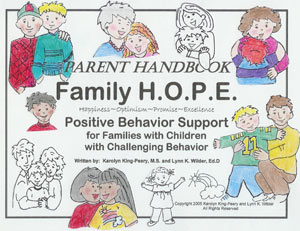
Using Positive Behavior Support (PBS) teaches the intrinsic value of all individuals with disabilities, independent of problem behavior. PBS is a collaborative assessment-based means to develop a plan of behavior support and intervention for individuals with problem behavior.
PBS builds collaborative relationships between families and professionals. The family is a child's most valuable and durable resource, and any intervention should be based on the family's strengths, abilities, and preferences. This family focus will help empower parents to understand and solve problems.
The Six Systematic Steps to Changing Problem Behavior is a learning module designed to help parents follow PBS principles to create positive, supportive home environments to prevent problem behaviors from happening and to respond in nurturing and effective ways when problems do occur.
All six steps are important:
- Choose a problem behavior to change.
- Measure the problem behavior by collecting data.
- Determine the function (purpose) of the problem behavior.
- Conduct a functional behavior assessment.
- Create a behavior intervention plan.
- Teach a new alternative behavior.
Problem behaviors diminish a child's quality of life. Problem behaviors that begin in childhood will not naturally disappear; new behaviors must be taught.
Interventionists and family members need to build collaborative partnerships that are trusting, caring, and reciprocal, believing in each others' ability to make important contributions to the support process.
Using PBS principles to decrease a problem behavior and replace it with a new, more socially accepted behavior enables richer, more meaningful lives for family and child.